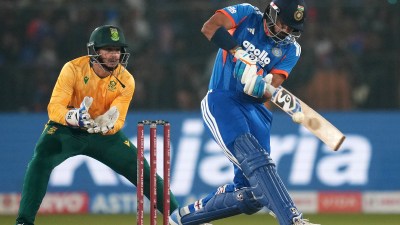Publicity, privacy rights of Sushant Singh Rajput ‘not inheritable’: Delhi HC refuses to restrain streaming of film based on late actor
Justice Shankar remarked there was no doubt in his mind that the movie is an "overt re-enactment" of Rajput's "life and times, concentrating largely on the circumstances leading to his death and the investigation that followed".
 SSR’s father argued it is not permissible for anyone to publish anything about the late actor either "laudatory or critical" without his consent. (Source: PR handout)
SSR’s father argued it is not permissible for anyone to publish anything about the late actor either "laudatory or critical" without his consent. (Source: PR handout) The Delhi High Court has refused to restrain the “continued streaming” of the movie Nyay: The Justice based on late actor Sushant Singh Rajput’s life which was released on OTT platform Lapalap in June 2021.
A single judge bench of Justice C Hari Shankar in its July 11 order dismissed an application moved by Sushant Singh Rajput (SSR)’s father who claimed the movie has been made on the basis of “defamatory statements and news articles, which alleged that Sushant Singh Rajput was subject to various vices such as drug addiction, etc, without any verification and without obtaining any report from any official agency to the said effect”.
SSR’s father also argued it is not permissible for anyone to publish anything about the late actor either “laudatory or critical” without his consent.
Justice Shankar, who had watched the movie, observed, “The reliefs sought in the plaint are entirely with respect to SSR. The rights that the prayers in the suit seek to protect are the rights of privacy, publicity, and personality which were vested in SSR”. “The rights ventilated in the plaint… are not heritable. They died with the death of SSR. The said rights, therefore, did not survive for espousal by the plaintiff,” he added.
He said information in the movie is entirely derived from “items which featured in the media and, therefore, constitute publicly available information”.
“In making a film on the basis thereof, it could not, therefore, be said that the defendants had violated any right of SSR, much less of the plaintiff, especially as the said information had not been questioned or challenged when it appeared in the media, either by SSR or by the plaintiff. Nor were the defendants required to obtain the consent of the plaintiff before making the movie,” Justice Shankar observed.
The court said assuming the movie did infringe the late actor’s “publicity rights” or defames him, the “infracted right is personal to SSR, and cannot be said to have been inherited by the plaintiff”.
“All right infractions, that the plaintiff alleges in the plaint, are not his, but SSR’s. SSR is no more. The rights themselves are not heritable. The plaintiff does not seek to contend that SSR ever authorised the plaintiff to canvass his rights on his behalf. Besides, the impugned movie, being based on information in the public domain, which, at the time of its original dissemination, was never challenged or questioned, cannot be sought to be injuncted at this distance of time, especially when it has already been released on the Lapalap platform a while ago and must have been seen, by now, by thousands. The movie cannot be said to be infracting Article 19(2) of the Constitution of India. Injuncting further dissemination of the movie would, therefore, infract the defendants‘ rights under Article 19(1)(a),” the HC said.
Justice Shankar remarked there was no doubt in his mind that the movie is an “overt re-enactment” of Rajput’s “life and times, concentrating largely on the circumstances leading to his death and the investigation that followed”. He said the characters in the movie were “merely aliases” for “Sushant Singh Rajput, Rhea Chakraborty, and Rajput’s father”.
Observing that the concept of celebrity rights as a “distinct compendium of rights only available to celebrities” is “unacceptable”, Justice Shankar said, “The law cannot allow itself to be a vehicle to promote celebrity culture. Rights which emanate from one‘s personality, and persona, would be available to one and all, and not only to celebrities. Rights which enure because of the special personal achievements of individuals are, of course, to be sedulously protected, and deserve recognition. That is altogether different from conferring, on an individual, additional rights merely because he, or she, is a celebrity”.
Justice Shankar also rejected SSR’s father’s contention that permitting the telecast of the movie will prejudice the right to a fair, free and dispassionate trial of the circumstances surrounding SSR’s death. “Our legal system is, fortunately, not so fickle as to justify any apprehension that the dispensers of justice, who constitute its ethos and backbone, would decide on the basis of the facts depicted in a movie,” the judge added.
Justice Shankar, however, said the “right” of the plaintiff (father) to “maintain and prosecute” the main lawsuit with respect to his claim of damages from the defendants–the producers and director, stood “preserved”. “This Court expresses no view on the merits thereof,” he said.
The movie is about an upcoming actor who dies and the questions around his death remain unanswered. It shows his father living with his daughters and interacting with the media, which is raising questions about the death of his son, the court noted.
Among other things, the movie in flashback mode shows the actor giving auditions, and then shooting for Pavitra Bandhan as well as parting ways with his co-star in the serial as he wishes to move ahead in life. It also shows one of his movies Cricket as a box office hit.







